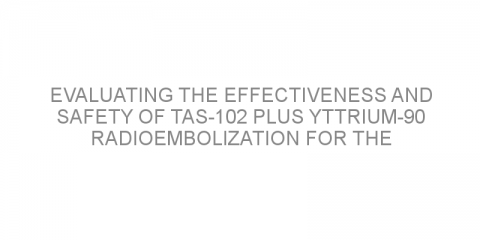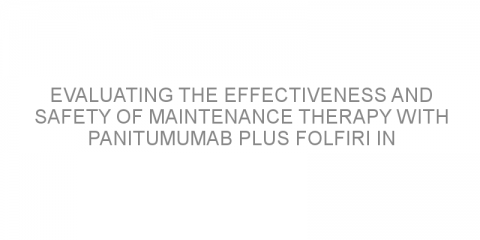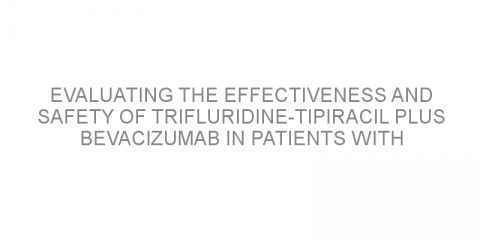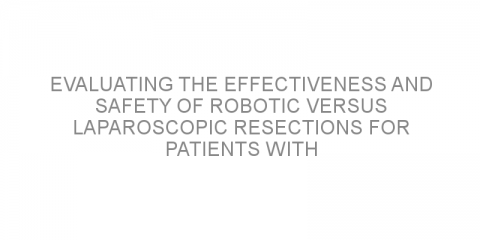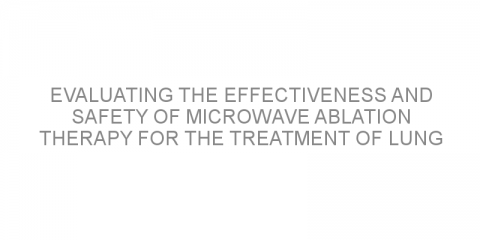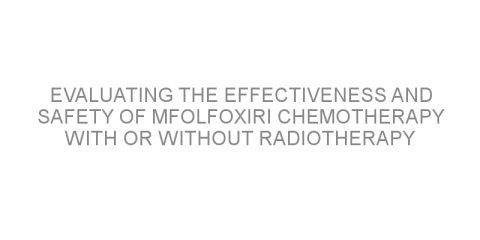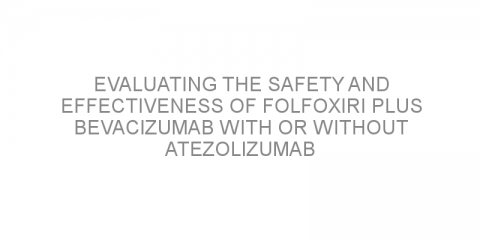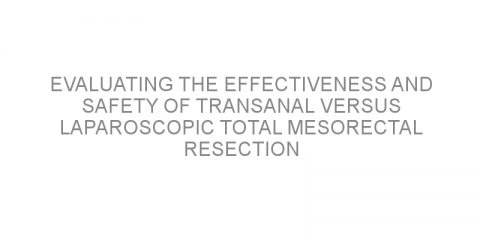In a nutshell This study evaluated the effectiveness and safety of TAS-102 (Lonsurf; trifluridine-tipiracil) plus Yttrium-90 (Y-90) radioembolization (RE) for patients with colorectal cancer liver metastasis (CRLM) who are unresponsive to chemotherapy. The data showed that TAS-102 plus RE was safe and effective in these patients. Some background...
Read MoreColorectal cancer Posts on Medivizor
Evaluating the effectiveness and safety of maintenance therapy with panitumumab plus FOLFIRI in patients with RAS wild-type metastatic colorectal cancer.
In a nutshell This study evaluated the effectiveness and safety of panitumumab (Vectibix) rechallenge when added to maintenance therapy with FOLFIRI {fluorouracil (FU; Adrucil), folinic acid (FA; Leucovorin), irinotecan (Camptosar)} in patients with RAS wild-type metastatic colorectal cancer (mCRC). The data showed that maintenance therapy with...
Read MoreEvaluating the effectiveness of chemotherapy for patients with resectable colorectal cancer liver metastases.
In a nutshell This study evaluated the effectiveness of chemotherapy before surgery for the treatment of patients with resectable colorectal cancer liver metastasis (CRLM). The data showed that the addition of chemotherapy before surgery significantly improved disease-free survival (survival without any signs or symptoms of cancer) but not the...
Read MoreEvaluating the effectiveness and safety of trifluridine-tipiracil plus bevacizumab in patients with resistant metastatic colorectal cancer
In a nutshell This study evaluated the effectiveness and safety of the combination of trifluridine-tipiracil (Lonsurf) and bevacizumab (Avastin) in patients with unresponsive (refractory) metastatic colorectal cancer (mCRC) in a real-world setting. The main finding was that trifluridine–tipiracil plus bevacizumab was safe and effective in...
Read MoreEvaluating the effectiveness of chemotherapy before surgery for patients with colorectal cancer liver metastases.
In a nutshell This study evaluated the effectiveness of chemotherapy given before surgery (neoadjuvant chemotherapy; NAC) for the treatment of patients with colorectal cancer liver metastasis (CRLM) at high risk. The data showed that NAC improved the overall survival of these patients. Some background Colorectal cancer (CRC) is one of the most common...
Read MoreEvaluating the effectiveness and safety of robotic versus laparoscopic resections for patients with low rectal cancer.
In a nutshell This study evaluated the effectiveness and safety of robotic versus laparoscopic abdominoperineal resections (APRs) for the treatment of patients with low rectal cancer (RC). The data showed that robotic APRs significantly reduced surgical trauma and promoted recovery after surgery compared with laparoscopic APRs in these patients. Some...
Read MoreEvaluating the effectiveness and safety of microwave ablation therapy for the treatment of lung metastases in patients with colorectal cancer.
In a nutshell This study evaluated the effectiveness and safety of microwave ablation (MWA) therapy for the treatment of lung metastases in patients with colorectal cancer (CRC). The data showed that MWA therapy might be a safe and effective option for these patients. Some background CRC is one of the most common types of cancer worldwide. Some...
Read MoreEvaluating the effectiveness and safety of mFOLFOXIRI chemotherapy with or without radiotherapy before surgery in patients with locally advanced rectal cancer
In a nutshell This study evaluated the effectiveness and safery of administering modified (m) FOLFOXIRI (folinic acid, fluorouracil, irinotecan, oxaliplatin) chemotherapy with or without radiotherapy before surgery in patients with locally advanced rectal cancer (LARC). The results showed that this treatment was safe and improved survival without disease...
Read MoreEvaluating the safety and effectiveness of FOLFOXIRI plus bevacizumab with or without atezolizumab in the treatment of metastatic colorectal cancer
In a nutshell This study evaluated the effectiveness and safety of FOLFOXIRI (fluorouracil, leucovorin, oxaliplatin, and irinotecan) plus bevacizumab (Avastin) with or without atezolizumab (Tecentriq) on the outcomes of patients with metastatic (m) colorectal cancer (CRC). The study showed that adding atezolizumab to FOLFOXIRI plus...
Read MoreEvaluating the effectiveness and safety of transanal versus laparoscopic total mesorectal resection for the treatment of patients with rectal cancer.
In a nutshell This study evaluated the effectiveness and safety of transanal (ta) versus laparoscopic (lap) total mesorectal resection (TME) for the treatment of patients with stage I-III rectal cancer (RC). The data showed that experienced surgeons can safely perform taTME in these patients. Some background Rectal cancer (RC) is one of the most...
Read MoreEvaluating the effectiveness of transanal endoscopic microsurgery for the treatment of early rectal cancer in patients over 60 years old with high surgical risk.
In a nutshell This study evaluated the effectiveness of transanal endoscopic microsurgery (TEM) for the treatment of early rectal cancer (RC) in patients over 60 years old with high surgical risk. The data showed that TEM is a reliable and effective treatment option in high-risk patients over 60 years old. Some background Rectal cancer (RC) is one of...
Read MoreEvaluating the effectiveness of massage therapy for chemotherapy-induced nerve disease
In a nutshell The study evaluated the effectiveness of massage therapy for chemotherapy-induced peripheral neuropathy (CPIN) in patients with breast and gastrointestinal (GI) cancer. The main finding of the study was that intensive massage therapy 3 times a week showed promising results in these patients. Some background There are many cancer...
Read More
